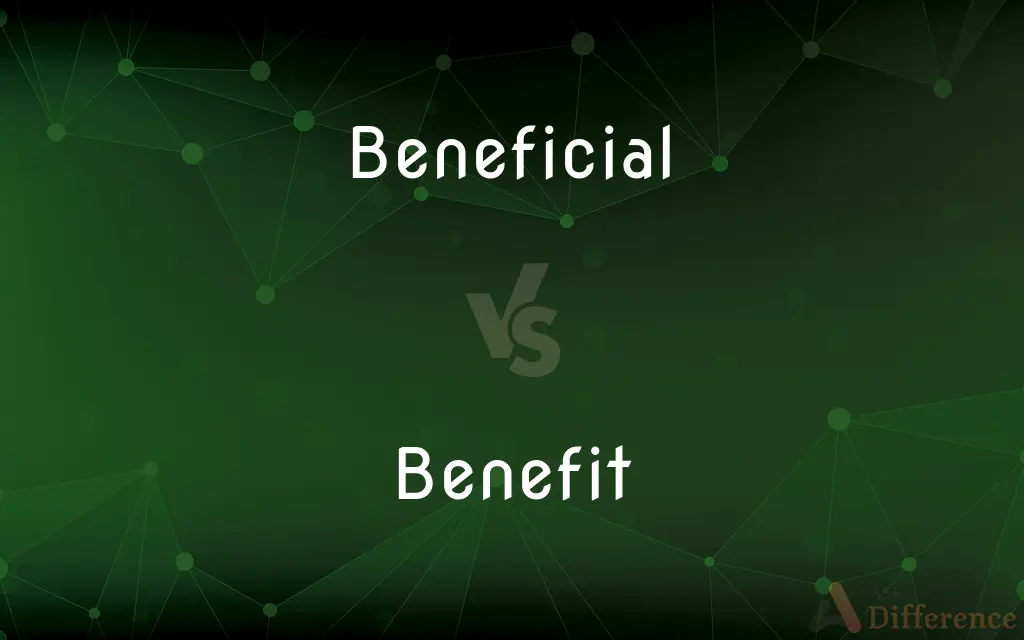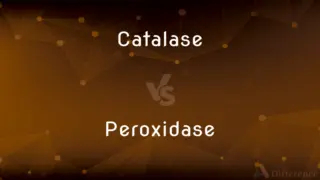Beneficial vs. Benefit — What's the Difference?
By Urooj Arif & Maham Liaqat — Updated on April 7, 2024
Beneficial describes something providing benefits, while benefit refers to the advantage or gain received.

Difference Between Beneficial and Benefit
Table of Contents
ADVERTISEMENT
Key Differences
Beneficial is an adjective used to describe something that provides advantages or is good for someone or something. It emphasizes the positive impact or outcome of an action, situation, or object on an individual, group, or environment. For example, eating vegetables is beneficial to health, indicating that it promotes good health outcomes. On the other hand, benefit is a noun (and can also be a verb) that refers to the actual advantage, profit, or good that is gained from something. For instance, the benefit of eating vegetables is improved health, directly pointing to the advantage received.
Beneficial is often used to qualify or describe the nature of something in terms of its capacity to produce positive effects or outcomes. It is used in a variety of contexts, from health and medicine to economics and environmental science, underscoring the potential or actual positive qualities of an action or entity. Whereas benefit, as a noun, quantifies or identifies those specific advantages or positive outcomes derived from an action, policy, or circumstance. It is what people seek to gain or achieve by engaging in a particular activity or by utilizing a particular resource.
When discussing policies, practices, or products, beneficial serves to characterize their overall positive attributes or value. For example, discussing a beneficial policy implies looking at its positive aspects and potential to improve conditions or solve problems. Conversely, talking about the benefits of a policy focuses on the specific gains or improvements that can be directly attributed to it, such as cost savings, health improvements, or increased efficiency.
In a medical or health-related context, beneficial can be used to describe treatments, habits, or substances that promote health and well-being. For instance, describing an activity as beneficial suggests it has health-promoting qualities. In contrast, discussing the benefits of that activity would involve detailing the specific health gains, like reduced stress or lower blood pressure.
While both terms are interconnected where the presence of something beneficial leads to benefits their usage highlights different aspects of the value or advantage provided. Beneficial frames the conversation around the capacity to do good or provide value, while benefit zooms in on the concrete advantages or positive outcomes realized.
ADVERTISEMENT
Comparison Chart
Part of Speech
Adjective
Noun (also verb)
Usage
Describes something that provides advantages.
Refers to the advantage or gain itself.
Contexts
Qualitative assessments, potential advantages.
Quantitative or specific gains, outcomes.
Examples
A beneficial habit, beneficial effects.
Health benefits, financial benefits.
Focus
Positive qualities or potential of an action/entity.
Concrete outcomes or advantages gained.
Compare with Definitions
Beneficial
Promoting well-being or positive outcomes.
Beneficial bacteria in the gut are essential for digestion.
Benefit
An advantage or profit gained from something.
The main benefit of meditation is reduced stress.
Beneficial
Providing advantages or positive effects.
Regular exercise is beneficial for cardiovascular health.
Benefit
To gain advantages from something. (verb)
Many communities benefit from local parks and green spaces.
Beneficial
Favorable or advantageous.
The policy changes are beneficial for small businesses.
Benefit
Financial assistance or payment.
The government provides unemployment benefits to eligible individuals.
Beneficial
Contributing to a positive or desired result.
The beneficial impact of recycling on the environment is well-documented.
Benefit
A helpful or good effect.
One benefit of a balanced diet is increased energy.
Beneficial
Good for someone or something.
A beneficial rain nourished the parched crops.
Benefit
A social event to raise funds for a cause.
The gala was a benefit for the local hospital.
Beneficial
Resulting in good; favourable or advantageous
The beneficial effect on the economy
The process was beneficial to both supplier and customer
Benefit
An advantage or profit gained from something
Enjoy the benefits of being a member
The changes are of benefit to commerce
Beneficial
Relating to rights to the use or benefit of property, other than legal title
The beneficiary will be taxed on the value of his beneficial use of the property
Benefit
A payment made by the state or an insurance scheme to someone entitled to receive it
Part-time jobs supplemented by means-tested benefits
Families on benefit
Beneficial
Producing or promoting a favorable result; advantageous
A trade agreement beneficial to all countries.
Benefit
An event such as a concert or game that is intended to raise money for a particular player or charity
A benefit gig
The social season was highlighted by debutante balls and charity benefits
Beneficial
(Law) Involving the receipt of funds, property, or other benefits, as from an insurance policy or trust.
Benefit
Receive an advantage; profit
The areas would benefit from regeneration
Beneficial
Organisms that are beneficial to a human endeavor, especially insects that are predators of pests.
Benefit
Something that promotes or enhances well-being; an advantage
The nurse explained the benefits of regular exercise.
Beneficial
Helpful or good to something or someone.
Recycling and reusing garbage can be beneficial to the environment.
Benefit
Help; aid
The field trip was of great benefit to the students.
Beneficial
Relating to a benefice.
Benefit
A payment made by a government agency or insurance company to qualifying persons in time of need
An increase in welfare benefits.
Beneficial
Something that is beneficial.
Benefit
A form of compensation, such as paid vacation time, subsidized health insurance, or a pension, provided to employees in addition to wages or salary as part of an employment arrangement. Also called fringe benefit.
Beneficial
Conferring benefits; useful; profitable; helpful; advantageous; serviceable; contributing to a valuable end; - followed by to.
The war which would have been most beneficial to us.
Benefit
A public entertainment, performance, or social event held to raise funds for a person or cause.
Beneficial
Receiving, or entitled to have or receive, advantage, use, or benefit; as, the beneficial owner of an estate.
Benefit
(Archaic) A kindly deed.
Beneficial
King.
Benefit
To be helpful or useful to.
Beneficial
Promoting or enhancing well-being;
An arms limitation agreement beneficial to all countries
The beneficial effects of a temperate climate
The experience was good for her
Benefit
To derive benefit
You will benefit from her good example.
Beneficial
Tending to promote physical well-being; beneficial to health;
Beneficial effects of a balanced diet
A good night's sleep
The salutary influence of pure air
Benefit
An advantage; help or aid from something.
She can't read, so the voice recording was made for her benefit.
Exposure to cutting-edge technologies is one of the benefits of the job.
Benefit
(insurance) A payment made in accordance with an insurance policy or a public assistance scheme.
Benefit
An event, such as a theatrical performance, given to raise funds for some cause.
Benefit
(obsolete) beneficence; liberality
Benefit
Intended audience (as for the benefit of).
The whole scene was staged for his benefit, and it completely fooled him.
Since my wife is Canadian, whenever we have dinner with my family, they keep bringing up anything they've heard about Canada lately for her benefit.
Benefit
(transitive) To be or to provide a benefit to.
Benefit
(intransitive) To receive a benefit (from); to be a beneficiary.
Benefit
An act of kindness; a favor conferred.
Bless the Lord, O my soul, and forget not all his benefits.
Benefit
Whatever promotes prosperity and personal happiness, or adds value to property; advantage; profit.
Men have no right to what is not for their benefit.
Benefit
A theatrical performance, a concert, or the like, the proceeds of which do not go to the lessee of the theater or to the company, but to some individual actor, or to some charitable use.
Benefit
Beneficence; liberality.
Benefit
Natural advantages; endowments; accomplishments.
Benefit
To be beneficial to; to do good to; to advantage; to advance in health or prosperity; to be useful to; to profit.
I will repent of the good, wherewith I said I would benefit them.
Benefit
To gain advantage; to make improvement; to profit; as, he will benefit by the change.
Benefit
Financial assistance in time of need
Benefit
Something that aids or promotes well-being;
For the common good
Benefit
A performance to raise money for a charitable cause
Benefit
Derive a benefit from;
She profited from his vast experience
Benefit
Be beneficial for;
This will do you good
Common Curiosities
How can a policy be both beneficial and have benefits?
A policy is beneficial in terms of its overall capacity to improve situations or conditions (qualitative), while the benefits of the policy are the specific gains or improvements realized (quantitative).
What makes something beneficial?
Something is considered beneficial if it provides advantages, positive effects, or contributes to well-being.
Can the benefits of something be negative?
While the term "benefits" generally implies positive outcomes, in some contexts, it can refer to gains that have negative implications for others or the environment.
Is beneficial always positive?
Yes, by definition, beneficial implies a positive impact or advantage.
How do benefits influence social policies?
The potential benefits of social policies, such as reducing inequality or improving public health, are key considerations in their formulation and implementation.
How do you identify a benefit?
A benefit is identified as a specific advantage, gain, or positive outcome derived from an action, situation, or resource.
Can something be beneficial without providing immediate benefits?
Yes, something can be beneficial if it has the potential to provide positive outcomes or advantages in the future, even if immediate benefits are not apparent.
Why is it important to distinguish between beneficial and benefit?
Distinguishing between the two helps clarify whether we are discussing the positive qualities or potential (beneficial) or the specific advantages gained (benefit).
Can something be beneficial for one aspect but not for another?
Yes, an action or resource can be beneficial in one context or for one purpose but neutral or even harmful in another.
How are beneficial and benefit used in health care?
In health care, beneficial describes treatments or practices that promote health, while benefits refer to the specific health improvements or gains from those treatments or practices.
What role does beneficial play in environmental discussions?
In environmental discussions, beneficial is used to describe practices or technologies that have a positive impact on the ecosystem or biodiversity.
What is the difference between direct and indirect benefits?
Direct benefits are the immediate, tangible advantages gained from an action, while indirect benefits are secondary or less obvious advantages that also result from the action.
How do benefits affect decision-making?
Understanding the benefits of different options can guide individuals and organizations in making informed decisions based on the anticipated advantages or positive outcomes.
Can the absence of something be beneficial?
Yes, the absence of harmful substances or behaviors can be beneficial, leading to improved health or environmental conditions.
How do businesses evaluate the benefits of their strategies?
Businesses evaluate the benefits of their strategies by assessing the financial gains, market growth, customer satisfaction, or other key performance indicators.
Share Your Discovery

Previous Comparison
Catalase vs. Peroxidase
Next Comparison
Refrain vs. ChorusAuthor Spotlight
Written by
Urooj ArifUrooj is a skilled content writer at Ask Difference, known for her exceptional ability to simplify complex topics into engaging and informative content. With a passion for research and a flair for clear, concise writing, she consistently delivers articles that resonate with our diverse audience.
Co-written by
Maham Liaqat













































